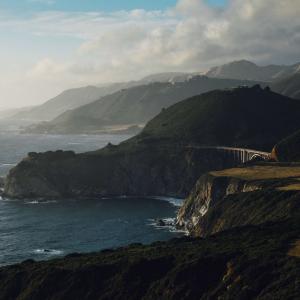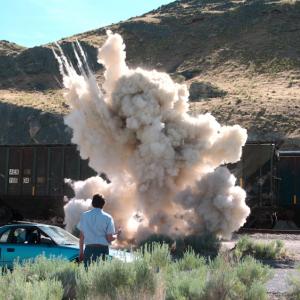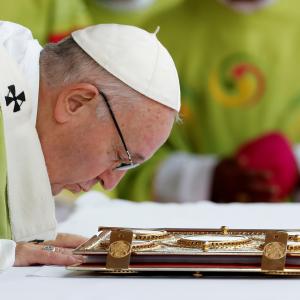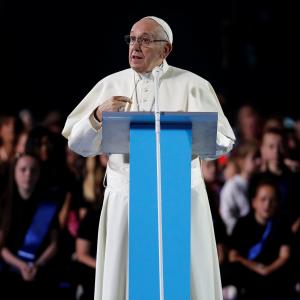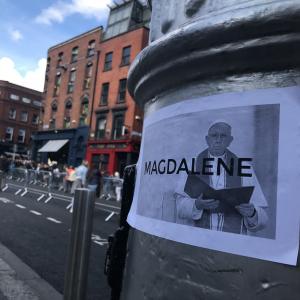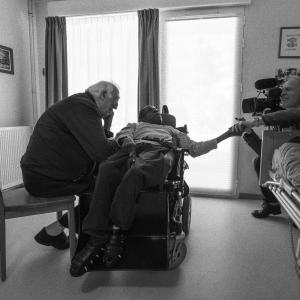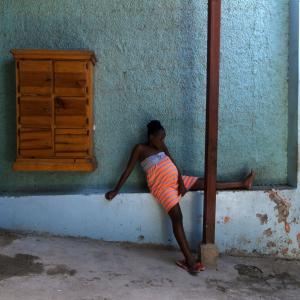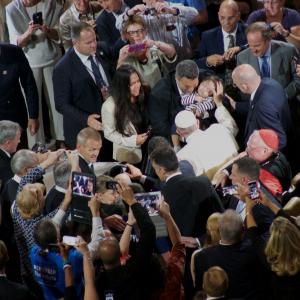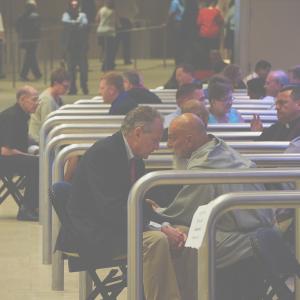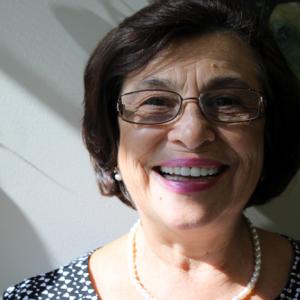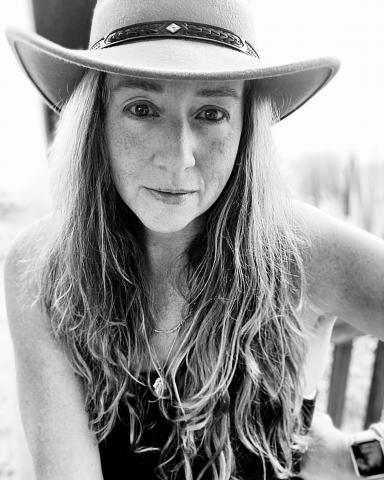
Cathleen Falsani is a longtime religion journalist and author of six nonfiction books. You can follow her on Twitter @godgrrl and read more of her work via The Numinous World.
Posts By This Author
After 20 Months of Social Distancing, Why Did I Crave Solitude?
This quietude at New Camaldoli is different than the imposed silence that accompanied the global time-out wrought by the pandemic. That silence descended like a pall when humans retreated, social distancing in the hopes of slowing the spread of a deadly virus. At the hermitage, the silence is chosen. In that choice there is a freedom to hear, see, and feel more of the natural world as well as our place in it. Such silence-keeping allows us to experience human community in a more deliberate and ultimately transformative way.
Fakes, Forgeries, and the Nature of Faith in ‘Murder Among the Mormons’
Where the particularly eclectic Venn diagram of true crime enthusiasm and religious history nerdery overlap, you’ll find your binge-worthy streaming recommendation for the weekend: Netflix’s compelling new limited series, Murder Among the Mormons.
From Tertullian to Disney: 2,000 Years of Godparenting
While Godmothered and its fairy are far from cinematic perfection, by the time the credits roll, Eleanor and Mackenzie have helped each other step more fully into who they both truly were meant to be. In this way, their relationship — minus the wand, the fairy dust, and any promise of true-love-happily-ever-afterness — more realistically resembles actual godparenting.
Meditating on Love and Connection with Mr. Rogers and C.S. Lewis
In his Neighborhood of Make-Believe, with simple hand puppets with complex internal lives such as Daniel Striped Tiger, Prince Tuesday, and Ana Platypus, he did something profound. Rogers and his collaborators on the show listened intently to children, created routine and a safe, sometimes magical place where they might be understood, affirmed, and cherished.
For those of us who perhaps didn’t always get the emotional support we needed at home, it was a gift that helped shape who we are as adults, parents, and grandparents.
Pope Francis Apologized to God for Church Abuses. Catholics Need an Apology to Them
There is a soulweariness shared by these ecclesiastical cousins on both sides of the Atlantic that pervades in the face of so much pain from the original insult, the resulting denials, obfuscation, and general mishandling; and, ultimately, the hope — that some measure of justice might be achieved and true healing commenced — repeatedly dashed.
Pope Francis' 'Off-the-Cuff' Prayers for Forgiveness Close Ireland Trip as Archbishop Alleges Cover-Up
Pope Francis wrapped up a whirlwind tour of Ireland by issuing his most detailed public apology to date for the horrific abuses suffered by generations of Irish families at the hands of the Catholic Church during an outdoor Mass for an estimated half-million people in Dublin’s Phoenix Park. In a litany of prayers described as “off-the-cuff” by spokespeople for the World Meeting of Families, the international event that brought the pontiff to Dublin this week, Pope Francis begged forgiveness for a laundry list of atrocities wrought by the church and its emissaries.
Pope Francis Begs Forgiveness for Sins of Church Abuse
Standing just a few feet away from where many Catholics believe the Virgin Mary appeared in 1879 to a dozen denizens of this bucolic corner of western Ireland at the height of a famine, on Sunday morning Pope Francis begged God’s forgiveness for the abuse of countless innocents by priests and other members of the Catholic Church.
Amid Church Abuse Crises, Pope Francis Speaks to a Transformed Ireland
When Pope Francis steps off of his chartered Alitalia flight from Rome at 10:30 a.m. Saturday, he will be walking into a country that is in some ways barely recognizable from the last time he visited the Irish Republic nearly 40 years ago.
Fr. James Martin: 'LGBT People Are As Much a Part of the Church as Pope Francis'
Whenever people try to exclude LGBT Catholics from the life of the church, they are “tearing apart the body of Christ,” Fr. James Martin told the standing-room-only crowd that packed a tented hangar Aug 23. at an international meeting of Catholic families in Dublin, Ireland. “At the World Meeting of Families, this is an important aspect: By not welcoming, by excluding LGBT Catholics, the church is falling short of its call to be God’s family."
'Summer in the Forest' a Moving Picture of Love and L'Arche
“This is how the world is meant to be.” That’s what Randall Wright, director of the exceptionally powerful new feature-length documentary Summer in the Forest, said he thought the first time he visited one of the L’Arche communities founded by Jean Vanier that are the subject of his film.
The Justice Message of Wes Anderson’s ‘Isle of Dogs’
There is a moral (some might even say spiritual) clarity shared by the young humans in Isle of Dogs Anderson hasn’t been celebrated in his previous films, and that feels particularly salient right now as we watch children, led by the student-activists from Parkland, champion a national movement to demand sweeping legal and political changes to combat the rampant gun violence that plagues our nation.
When the Seeds of Hate Land on Your Doorstep
Some of the boys involved in carrying out those acts in December we know, and we know their parents. The parents we do know are not frothing-at-the-mouth bigots. We can’t imagine their sons learned racist ideas at home.
But they learned them somewhere.
Racists and bullies aren’t born. They are made.
Haiti, After Hurricane Matthew
It’s been three weeks since I returned from Haiti and a fortnight since Hurricane Matthew made landfall along the southern coast of the Caribbean island, bringing its Category 5 devastation to the poorest nation in the Western Hemisphere.
And in the time that has passed since my first visit to Ayiti (as they say in Creole), I can’t stop thinking about her.
Paul Simon's Spiritual Fascination
Since the 1960s, Simon’s musical dialogue with his audience has been an adventure: through the mean streets of pre-Bloomberg New York City, on a bus across America, with a runaway bride, into the townships of South Africa, Chernobyl, the Amazon, fatherhood, the deep South, the ups-and-downs of enduring love, questions about mortality, and dreams of the afterlife.
That conversation (and adventure) continues with Stranger to Stranger at the velvet rope of a nightclub, with a homeless “street angel,” in a hospital emergency room, at the riverbank, an insomniac’s bedside, and a village in central Brazil that some might describe as a “thin place” — where the veil between this world and whatever lies beyond it is like gossamer.
Why We (Still) Love Pope Francis
“We do not remember days,” the Italian poet Cesare Pavese said, “we remember moments.”
Pavese’s words have come to mind often as I’ve thought about Pope Francis’ historic visit to the United States, particularly when people have asked me what the “best part” of covering the papal visit was for me.
My answer is always the same: hands down the best part was watching people see (and sometimes meet) Pope Francis in person for the first time.
Breaking In: Pope Francis in a Philly Prison
On May 31, 1973, a group of inmates at Philadelphia’s Holmesburg Prison walked into the deputy warden’s office to ask for the establishment of a special prayer room for Muslim prisoners. When Deputy Warden Robert F. Fromhold denied their request, inmates turned on him and Warden Patrick N. Curran, stabbing both men dead with shivs.
On the morning of Sept. 27, the last day of his first trip to the United States, Pope Francis visited a Philadelphia prison named for Curran and Fromhold, where he expressed solidarity with the female and male prisoners.
“I am here as a pastor, but above all as a brother, to share your situation and to make it my own,” he said, and bestowed one-on-one blessings upon a number of inmates — including several who appeared to be Muslim.
Bless Me Father, for I Have Sinned
“Brace yourself, Father,” I said, taking a seat in a plastic chair facing my would-be confessor in Madison Square Garden’s dimly lit Madison Bar on Friday, a few hours before the start of the papal mass.
The bearded Franciscan priest in his dove gray vestments laughed and said, “No way. It’s all fine. Think of it as a big embrace of forgiveness from your heavenly father.”
OK. I tried to warn you.
“Let me see if I remember how this goes,” I began. “Bless me father for I have sinned; it’s been 35 years since my last confession.”
He tried not to look startled and almost pulled it off.
“Well, I’m glad you’re here,” he said, smiling kindly as he reached beneath his cassock to pull out a small paperback tract that, he explained, contained a list of questions that he could ask me that might make recounting all of my trespasses since the third grade a little less daunting.
In U.S., Pope's Actions, As Usual, Tell a Richer Story
And then Wednesday night, at the end of a marathon day in the nation’s capital, after canonizing St. Junipero Serra at the National Basilica, the pope made an unscheduled, last-minute stop to visit with the Little Sisters of the Poor, a Catholic religious order dedicated to caring for the elderly. (The sisters gained notoriety for their lawsuit against the federal government over Obamacare’s contraception mandate, but reportedly the pope made no mention of it when he stopped by the Washington convent.)
“It’s his actions that give credibility to what he says,” Sister Mary Richard, a nun from Queens Village, N.Y., who met “Papa Francesco” during the surprise visit, told me Thursday morning as we both waited at Union Station to board an Amtrak train bound for New York City.
She continued,
“He was exhausted but he came. He took the time to come. We take care of the elderly and he said, ‘Thank you. People just throw them away or get rid of them.’
“When he arrived the Mother Superior went out to greet him and she said, ‘Holy Father you must be so tired.’ And he said, ‘Priests and bishops get tired, but you don’t count the cost. But nuns, they never complain.’ “It’s his attitude, ya know?”
What the Pope Saw On His Drive Through D.C.
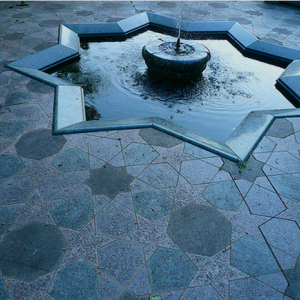
Image via Good Sweeney/Flickr
As Pope Francis’ motorcade made its way from the Joint Base Andrews in Maryland to the Apostolic Nunciature in Washington, D.C., late Tuesday afternoon, it made a hard left from scenic Rock Creek Parkway onto Massachusetts Avenue, wending its way northwestward at a fast clip along the manicured thoroughfare known as Embassy Row.
Riding in the passenger-side back seat of his tiny, black Fiat 500L, the 78-year-old pontiff leaned his body toward the open window, stuck his arm out, turned his smiling face toward the street, and waived at the modest clutches of pedestrians law enforcement had allowed to stand along the sidewalk to greet him as he whizzed by.
The pope rode past the South African embassy with its statue of Nelson Mandela, right arm raised in a fist of solidarity, out front — and then, almost directly across the street, the hulking statue of former British Prime Minister Winston Churchill raising two fingers in a peace sign (or to hail a cab) at the southernmost end of the British Embassy’s sprawling grounds.
The Mandela and Churchill statues almost high-five each other across Massachusetts Avenue while the pope’s humble hatchback, surrounded by massive Secret Service SUVs and swarms of police motorcycles, passed beneath their outstretched arms.
I wonder if Francis noticed the statues, and thought of the men — so different from one another, but each remembered as a hero — and wondered what his own place in history might be.
Lila Pays It Forward: Helping LGBT Refugees Find a New Home, Life
Currently, 78 nations worldwide criminalize same-sex relations; of those, seven may impose the death penalty for consensual same-sex conduct, according to ORAM. In Uganda, for instance, where there has been capital punishment for homosexual activity in the past, homosexuality currently is considered a criminal act punishable by a 14-year prison sentence.
At a recent JFCS-East Bay staff meeting, Weiss, director of refugee and immigrant services, recounted the story of a recent LGBT refugee arrival that brought many staff members to tears.
"One person who I had the honor to pick up at the airport and witness his experience and his mind was blown," Weiss began. "He went from having nothing — nobody to help him, in fear for his life, 23 years old (my daughter’s age) — having to flee barefoot, climb over a fence, escape prison, run for his life, police find him at his cousin’s house, re-arrest him … the story is just incredible. Multiple times fleeing on foot with no money, no water. Being in a refugee camp. Being beat up by a group of Somali men in the refugee camp that was supposed to be his refuge.
"Being physically and of course emotionally traumatized. And then getting on a plane — not knowing where he was going until he’s about to travel and then finding out he’s going to San Francisco," she continued. "On the way to the airport, we had this wonderful Iraqi LGBT volunteer who came five years ago as a refugee himself and he says to me, five minutes before the [new] guy arrives, ‘I’m five years old; I was born when I came down that escalator five years ago and this guy is about to be born.
"And down the escalator comes this jet black African guy who is obviously very gay — in the way you can tell by his escalator ride," she said, drawing knowing laughter from the staff, some of whom are LGBT themselves. "He couldn’t hide it. That’s why his life was in danger. On the way back from the airport, our volunteer says that after we drop him off, he’s going to The Castro, and [the new guy] says, ‘Can I come with you?!’
"It’s really just remarkable to witness his journey from hell to heaven," Weiss said.
